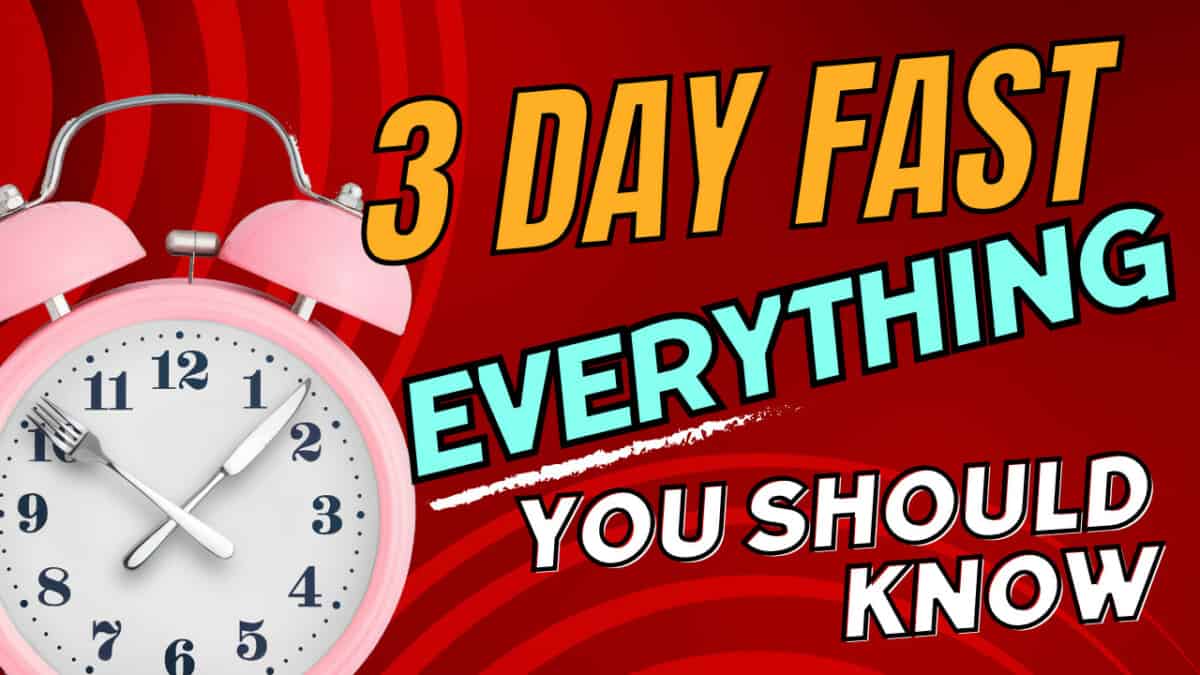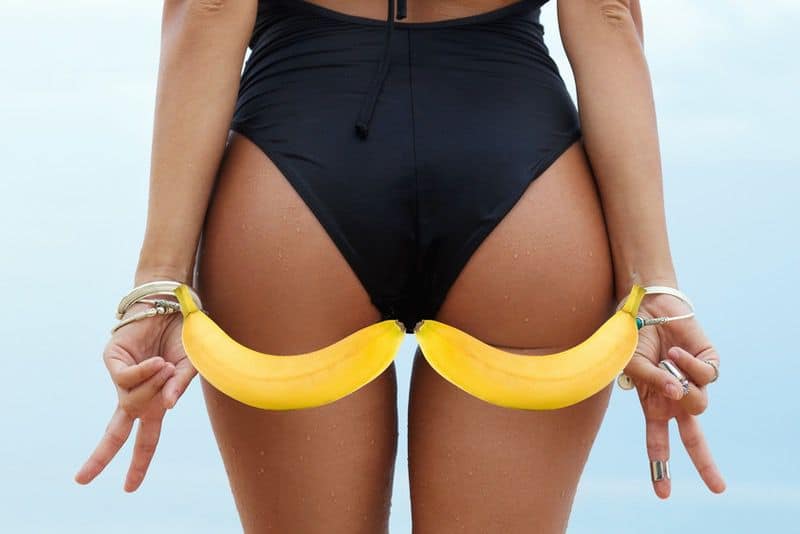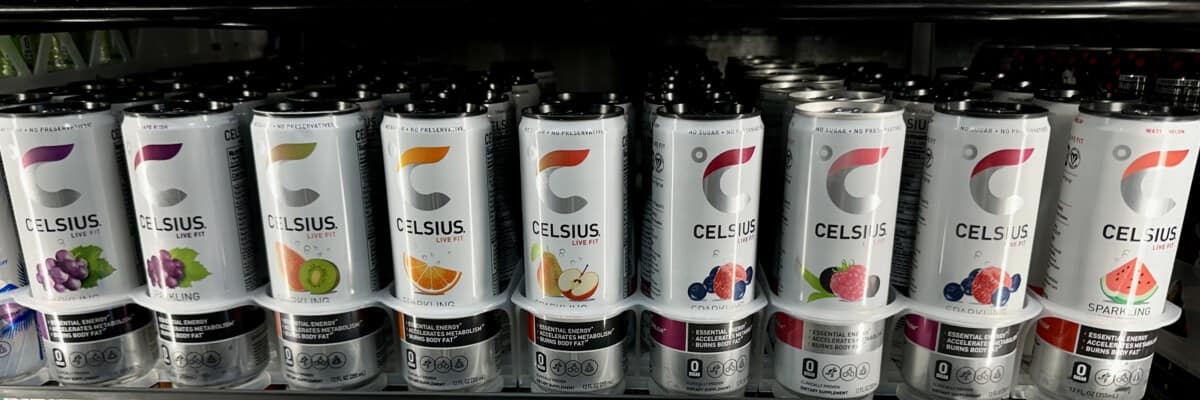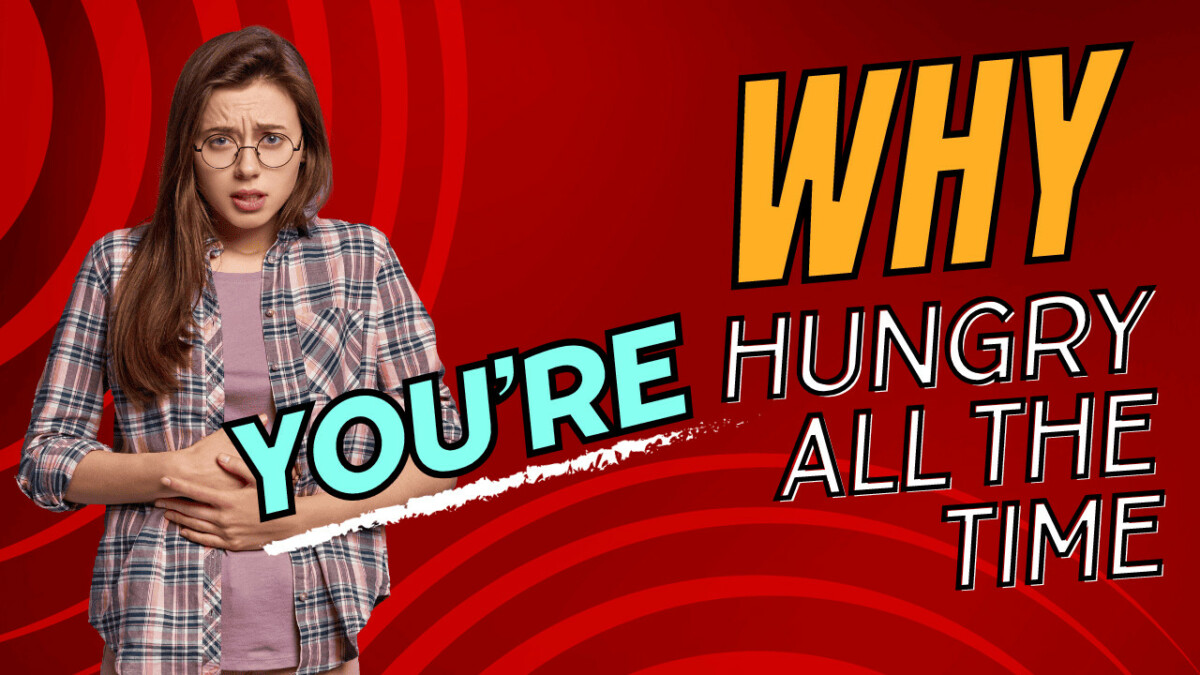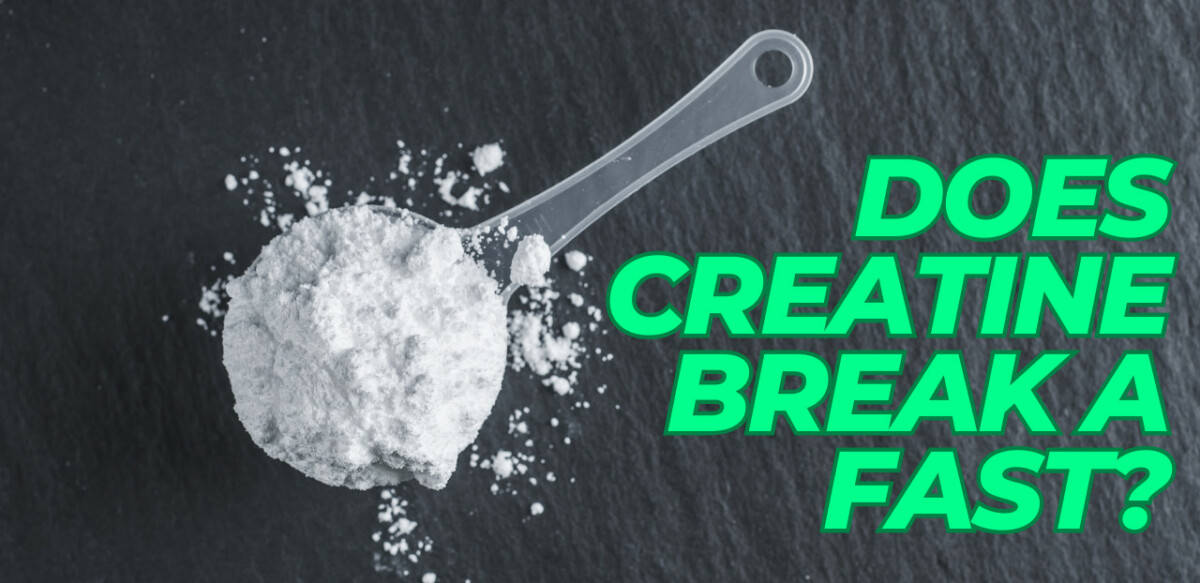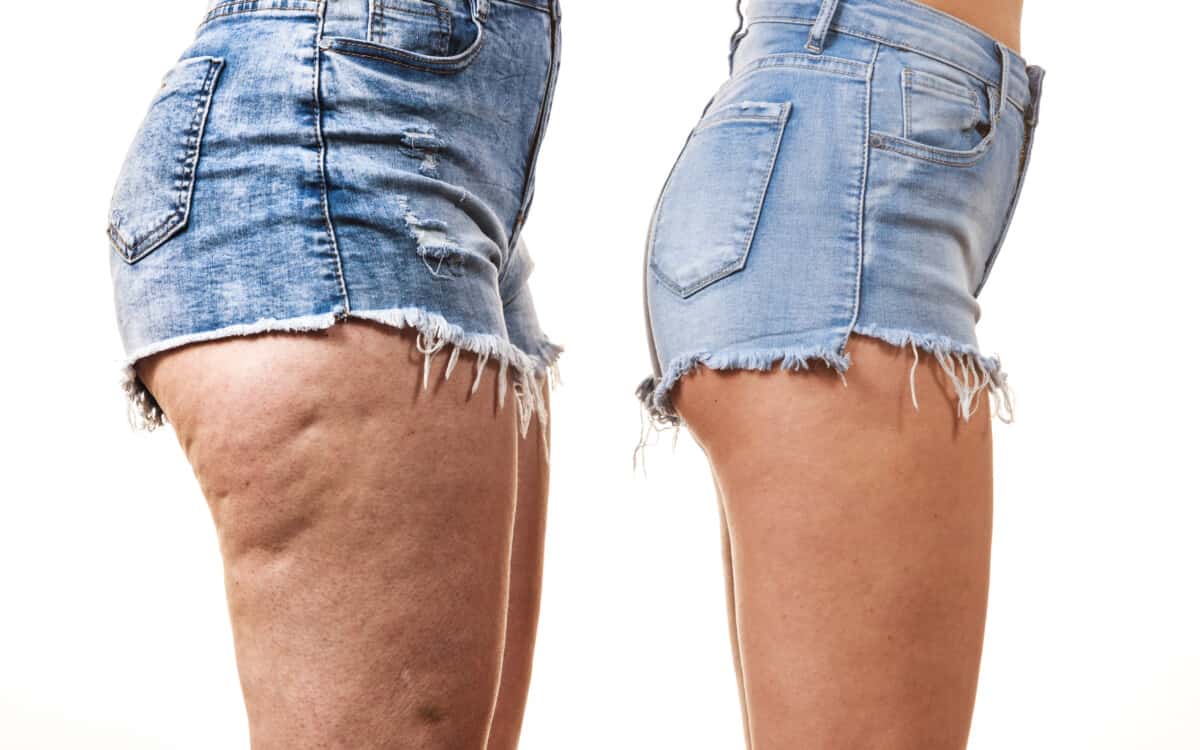Bananas are one of the most popular fruits, and just about everybody enjoys eating them. Some even believe that bananas can help with weight loss, but there are others who think eating bananas can make you fat.
But which is true? What exactly does science say about bananas and weight loss? It’s so confusing.
Bananas are rich in nutrients, provide quick energy boosts, and are easy to take on the go—but they may also be fattening because they contain sugar and carbohydrates.
We all know sugar isn’t good for weight loss, but is the sugar in a banana the same? And if you are going to eat bananas, when is the best time?
Here, you’ll find out if bananas are really fattening or if they’re good for weight loss. The answer is… it depends!
Eating Bananas When Trying to Lose Weight

Quick Answer: The sugar in bananas is lower on the glycemic index and, when combined with its fiber content, shouldn’t cause a weight-gaining insulin spike. The best bananas for weight loss are greener ones that contain more resistant starch (fiber) rather than sugar.
First off, bananas are packed with essential vitamins:
- Vitamin C
- Vitamin B6
- Vitamin A
- Vitamin B9 (Folate)
- Vitamin B2 (Riboflavin)
A single banana also contains over 400mg of potassium. Potassium is good for heart health, lowering blood pressure, metabolism, and the nervous system.
Bananas also contain a high amount of fiber. Fiber has been well-researched to be beneficial in preventing cancer. There are some interesting studies that have shown people who ate a lot of fiber daily had less risk of developing colon cancer.1
But since bananas are high in sugar and simple carbohydrates, it’s possible they can be fattening, too. Overconsumption of sugar is well known to lead to weight gain, type 2 diabetes, and obesity.2 Insulin resistance from eating too many sugars can make it harder for your body to burn body fat.3
Fruit advocates will be quick to tell you that banana sugars are “natural sugars.” Unlike table sugar (sucrose), fructose and glucose is the fruit in a banana, and your body processes the former differently.
Eating foods higher on the glycemic index can lead to insulin spikes, which can lead to weight gain.4 But fructose is lower on the glycemic index than sucrose. Greener bananas have a glycemic index of 42, while riper bananas can go up to 62.
But eating a banana is a healthier choice for weight loss and shouldn’t have the same blood sugar spike as say a candy bar. This is especially true because the fiber in bananas also slows absorption, leading to a reduced blood sugar spike.
Banana a Day = Too Much Sugar?

Let’s take a closer look at the sugar content in bananas: A medium banana contains about 14g of sugar. A banana can be better for weight loss than an apple since apples have 18g of sugar.
While the 14g of sugar isn’t too much… bananas are still higher in sugar than non-starchy vegetables and other low-sugar fruits like berries. By comparison, a 1/2 cup of blueberries only contains around 7g of sugar.
However, eating a banana is better for weight loss than drinking fruit juices.5 One cup of orange juice can contain up to 27g of sugar and doesn’t have any fiber to slow absorption. Its glycemic index is 50, which is about the same as ripe bananas.
On average, ripe bananas have a glycemic index of 51 out of 100, which puts them at a moderate level. However, their glycemic load (GL) is higher, with a score of 13 out of 20. The GL measures the carbohydrate portion size in the food in addition to how much it raises blood sugar.
One reason bananas are so popular is their sweet, creamy taste. If eating a banana satisfies your sweet tooth and keeps you from eating junk food like Oreos, then the banana will clearly be the better choice.
It’s a healthier way for many dieters who want to get their sugar fix without consuming sweets and other foods loaded with table sugar. You can eat a banana a day and still lose weight if you’re keeping your daily caloric intake in a deficit.
Best Bananas for Weight Loss
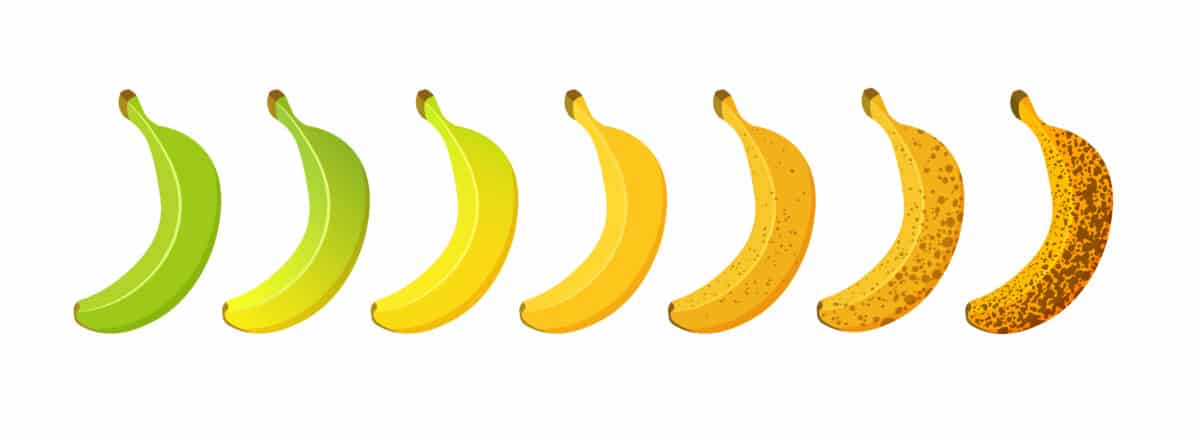
Greener bananas are the best bananas to eat if you’re trying to lose weight. They have more resistant starch than sugar, which is better than sugar because your body digests and absorbs it more slowly.
Eating a greener banana won’t cause as much of the blood sugar spike as you normally would from eating a ripe yellow and brown-spotted banana. This makes greener bananas a better choice if you’re trying to lose weight.6
Studies have found that consuming more resistant starch can lead to weight loss, improvements to blood sugar, higher satiety, and more fat burning.7 You’ll also have better bowel movements because the resistant starch turns into a source of fiber. It’ll also act as a prebiotic, creating a healthy environment for beneficial gut bacteria to flourish.8
Is a banana a day too much sugar?
I wouldn’t eat more than one per day. It’s best to limit fructose, especially if you’re insulin-resistant and metabolically inflexible.9 So eating two yellow bananas a day isn’t the best choice if you want to lose weight.
That said, you can still lose weight from eating bananas even with all those concerns. If you’re keeping your calories in a deficit and eating well the rest of the time, then you should still be able to lose weight unless you have insulin resistance issues.
Stay away from banana chips or a dried fruit version since they can have more sugar and are easy to overeat.
I’d also avoid mixing bananas with fats. For example, eating bananas with peanut butter can cause you to be more likely to store those extra calories from fats as belly fat.
Key Takeaways:
Green bananas are the best kind of banana to eat if you’re trying to lose weight. Green bananas contain more resistant starches than sugar compared to riper yellow/brown bananas.
Greener bananas contain less sugar and more fiber and shouldn’t spike your blood sugar or insulin as much. This makes greener bananas better for weight loss.
If you are going to eat a banana, then it’s best to have an unripe banana that’s still a bit green.
Who Should Avoid Bananas
If you are insulin-resistant, you might want to avoid eating bananas and other high-sugar fruits. Your body has a harder time processing sugars and carbohydrates if you are insulin-resistant. So, if weight loss is your goal, then eating more sugar and carbohydrates isn’t going to help.10
Those who are diabetic or insulin resistant might want to avoid eating sugars, carbs, and starches. Most who fit in this category have a harder time processing these sugars, and it’ll make it more difficult to lose weight.
So, if you are insulin-resistant, stick with non-starchy vegetables and very low-sugar fruits like berries instead. A low glycemic index diet results in greater weight loss in those with higher insulin levels.11
Now, if you are metabolically flexible and insulin sensitive, then eating a banana a day will be fine. Metabolic flexibility is the ability for your body to easily use sugars and carbs for energy rather than storing them as fat. The more insulin-sensitive you are, the better your metabolic flexibility will be.12
The more muscle you have then the better metabolic flexibility you’ll have. Muscle enhances your body’s ability to use sugar efficiently as a fuel source. If you eat a banana after a weight lifting work out then your body will store those sugars as glycogen in the muscles (instead of storing as fat).13
Tip of the Day:
Don’t add a banana to your smoothie. Bananas contain a flavanol blocking enzyme called polyphenol oxidase. Polyphenol oxidase can cancel up to 84% of the beneficial flavanols in your smoothie from fruits and veggies.14 Flavanols are natural yet powerful bioactive compounds with high antioxidant properties.
Don’t Eat Bananas at Night
The reason some say not to eat bananas at night is due to their sugar and carbohydrate content. The sugars in bananas can be more likely stored as body fat if they’re not used immediately as a fuel source.15
Most people are less active at night so it’s less likely they’ll use those sugars for fuel. Sugars and carbs are your body “instant fuel” source. If they’re not used quickly for fuel by being active then they can become more likely stored as fat.
But following an evening weight lifting workout can be one instance when eating a banana at night is good. With a HIIT or weight lifting workout, your body will burn through glycogen (stored sugars in your muscles).16
So, if you have sugar or carbs at night following a workout, you’ll be more likely to store them as glycogen in the muscles. This helps with recovery by restoring lost glycogen and prevents the sugars from being stored as body fat.
But if you aren’t working out in the evening, then the best fruit to burn fat at night is berries. Blueberries, for example, are high in antioxidants that reduce inflammation. They’re low in sugar and yet filling due to their fiber content.17 This makes them a better belly fat-burning fruit at night.
Action Summary
So, are bananas fattening? Not really, but it depends.
The truth about bananas being fattening or good for weight loss depends largely on your current body type, metabolic health, and the amount consumed. But I’ll also be the first to say that eating a banana shouldn’t be demonized like eating a super-sized McDonald’s french fries.
Fructose overconsumption can mess with your hunger hormones, leptin and ghrelin causing you to overeat.18 Along with their sugar content, is why eating fruit such as bananas should only be done in moderation.
I personally try not to eat a lot of high-sugar fruits like bananas, apples, and oranges. Instead I eat more green leafy and cruciferous veggies along with low-sugar fruits like berries and avocado. But if you’re not able to eat all your veggies (most don’t) then consider a super greens powder.
Be sure only to eat greener bananas and stay away from the more ripe yellow bananas with brown spots. The more ripe the banana then the more sugar content it has. But even with that said, bananas have health benefits and you can still eat a banana a day if you’re eating well the rest of the time and in a calorie deficit.
Josh holds a Bachelor’s degree in Exercise Physiology and Nutrition Science. He’s a Certified Strength and Conditioning Specialist (CSCS) by the National Strength and Conditioning Association and he’s a Certified Personal Trainer (CPT) by American Council on Exercise. He’s worked as a Strength and Conditioning Coach at the high school and college levels. He has over 15 years of experience as a personal trainer and nutrition coach. He strives to bring inspiration and results for people to live healthier lives through smart diet and exercise.



